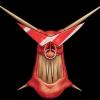There's so much going on in this thread.
The most challenging bit to look past is the supposition that synthetic instruments are unfeeling. This is just silly. All instruments are manufactured. It's easily suggested that instrument design and building is one of our earliest forms of sound-design for the technique in building an instrument was creating something that had interesting and musical timbre and likely, one that could be well articulated by a performer. Instruments grow in popularity based on how flexible and usable they are in multiple contexts. The bowed string family, specifically that of the violin, could be considered one of the most versatile acoustic instruments ever designed. There is an incredible breadth of possible timbre and articulation, so much so that it is one of the most defacto instruments when putting together an acoustic ensemble (at least until the guitar became way cooler).
Likewise, Nathan Madsen plays (and I have hired him to play) an acoustic instrument that Henry Mancini considered one of the most versatile wind instruments ever designed--and it showed, because Mancini loved employing and used brilliantly the saxophone section.
Synthetic instruments are simply the next step in the progression of instrument design. And just like acoustic instruments, they are subject to the emotional expression and articulations of their designers and performers.
People are still playing instruments.
People have as much feeling or little feeling in their performances as anything else.
When you're a MIDI programmer, a lone music producer who has to program their own performances, frankly, if you're not very good at your job, then you're not going to get great performances out of your tools. It's on you to learn how to do that, but don't complain that synths have no feeling because I have heard synths played with feeling everything from well performed synths in music scores to beautiful Theremin solos.
More on point:
Assassin's Creed presents a particularly interesting situation. By its very narrative nature, AC is anachronistic in its aesthetic design. Generally, you play someone who is in a way transported back in time from the present to the past to possess a long dead relative. This means that there needs to be a strange marriage of technology and period aesthetics in its musical design and direction. It's important in a demonstration that you present not simply your musical skill, but your ability to understand aesthetic choices.
We are not merely making a simulation, we're making art and entertainment and it's absolutely critical that you demonstrate (for your reel) that you have an aptitude for aesthetics and an understanding of not simply the role of an orchestra in a musical presentation, but the role of every instrument at your disposal. With your rejection of synthetic instruments, how do you intend to express the tension that this AC scenario is one that is facilitated through time-travel science? When your character dies, they go back in time, when they hit pause, the aesthetic of the menu screen is electronic. How do you intend to resolve this in your rejection of synths simply because you don't think they have feeling?
Those are serious questions--do not merely deflect criticism by calling out your critics.
Nathan Madsen used to be the Audio Lead at NetDevil, which was a 150 person game studio making million dollar MMOs--he's also been a composer/sound designer for Funimation and he's also an excellent and serious musician with real instrumental skill. You are absolutely fortunate to have someone like him give you honest and sincere feedback.
And as far as mixing engineers go, what you have to understand about mixing engineers is that they operate as service providers. Their job is to mix your music the way you want it mixed. But that choice is absolutely subjective and frankly, any mixing engineer worth their salt will tell you the same--there are a ton of approaches to mixing an ensemble, especially an eclectic one like yours. I will also tell you that audio directors pay attention to how well music might sit in a game mix--they care about that because their whole focus is not music and frankly music is almost never a primary focus in a big game. I want to say the last time I went to a GANG Demo Derby, Paul Lipson probably made a comment on whether or not the music would sit in a game-mix on like 20% of the participants and he's audio director at Microsoft Games. This stuff is not trivial, don't trivialize it. Just take the criticism you can use and use it, no big deal.
Here's mine:
I'm not a big fan of the piano, especially on the second entry when it drops back down to ambient after your character kills like a dozen dudes. I feel like slaughtering a bunch of guys near an enemy camp doesn't instantly send you back into a (mostly) calm Zen mode and the slight string bends you have during the ambient music isn't enough to combat the absolute consonance of the piano part. It's also incredibly front and center. I would just try taking it out or maybe substituting its presence with a more hidden string part. I liked the hand percussion when it was there, and there's probably some interesting opportunities to bring in more hand percussion during the ambient parts (like rubbing the drum head with a rubber mallet, etc.). Maybe some low flutes or ambient horns could touch more on the Native American theme while adding more tension with non-diatonic tuning.
I would tighten up your FMOD cue points. You end the battle music before you even kill the last dude (the game system has no idea that he's certainly going to die, so it wouldn't know to cue the change before hand) and the changes are extremely abrupt--that is to say, non-musically abrupt, which is something Nathan talked about. Don't worry about that too much, just keep making interactive music and you'll get better at the transitions.
But all that stuff is not trivial, audio directors would hear all that--and probably more.
Cheers,
EDIT: PS: Be sure to check out Jean Michel Jarre, Vangelis, Ryuichi Sakamoto, Enya, Brian Eno, and so much more for great examples of "feeling" synths.







